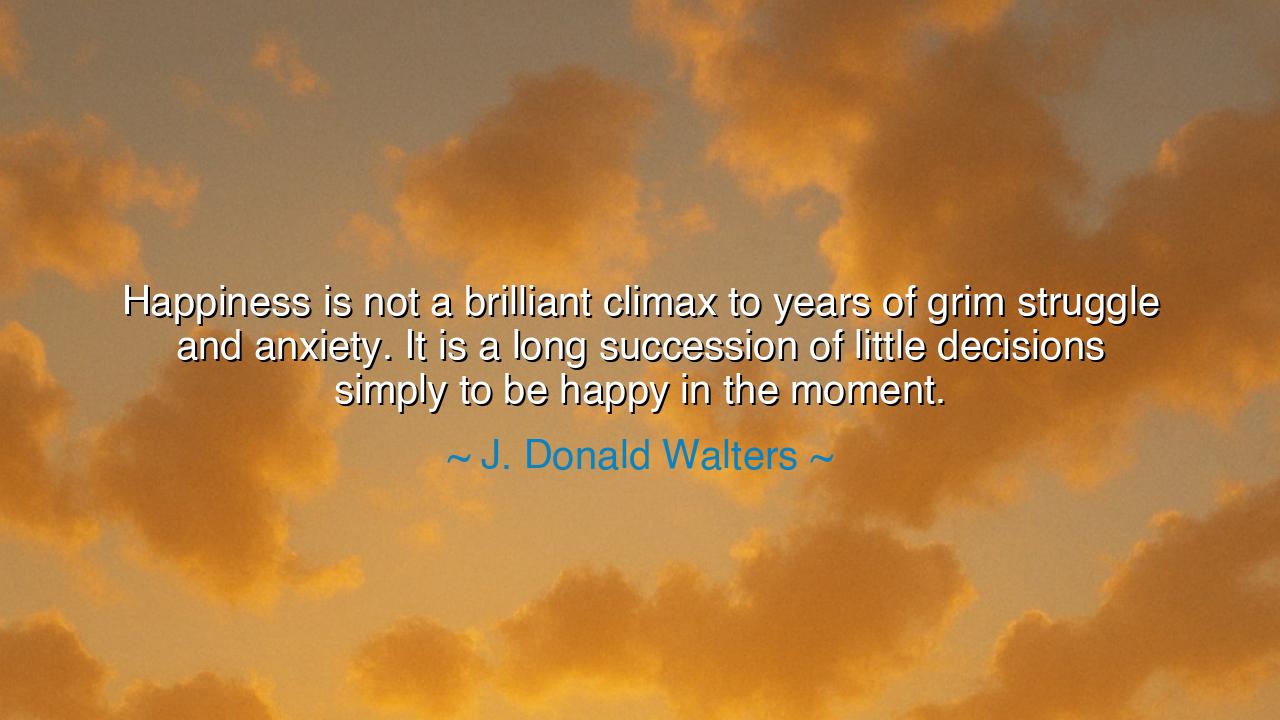
Happiness is not a brilliant climax to years of grim struggle and
Happiness is not a brilliant climax to years of grim struggle and anxiety. It is a long succession of little decisions simply to be happy in the moment.






“Happiness is not a brilliant climax to years of grim struggle and anxiety. It is a long succession of little decisions simply to be happy in the moment.”
Thus spoke J. Donald Walters, also known as Swami Kriyananda, a disciple of Paramhansa Yogananda and a teacher of inner harmony. In this quiet yet profound statement, he offers a truth that pierces through the illusions of the modern age: that happiness is not a distant treasure found at the end of hardship, but a living choice made moment by moment, like drops of light gathered into the sea of joy. His words remind us that the spirit’s peace is not a reward—it is a practice, a sacred rhythm of deciding, again and again, to dwell in the present with gratitude.
From the beginning of time, humankind has sought happiness as though it were a mountain summit, attainable only after long suffering and toil. We chase it in wealth, fame, love, and achievement, thinking, “When I arrive, I will rest.” But as Walters teaches, such thinking is the very chain that binds us. Happiness does not lie beyond the horizon—it lies beneath our feet. It does not await us in some radiant future; it quietly abides in the stillness of now. Each breath, each smile, each act of kindness is a thread in the tapestry of joy. To live with awareness of this is to live freely, to turn the journey itself into the destination.
The ancients knew this truth well. The Stoic philosopher Epictetus taught that “there is only one way to happiness, and that is to cease worrying about things beyond our control.” Likewise, the Buddha declared that “the mind is everything; what you think, you become.” Walters, walking in this lineage of timeless wisdom, reminds us that happiness is not an event—it is a state of consciousness. When we decide to meet each moment with openness and peace, even the smallest act—pouring water, watching the sunrise, hearing a child’s laughter—becomes holy. The brilliance of life is not in its peaks, but in its constancy, in the thousand quiet decisions that shape the heart.
Consider the life of Helen Keller, born into darkness and silence. The world could have offered her every excuse for despair, and yet she chose joy. Through the guidance of Anne Sullivan and the fire of her own spirit, she discovered beauty in touch, hope in struggle, and gratitude in the smallest of victories. Her life was not marked by a single climactic triumph, but by countless small decisions to learn, to love, to persevere. In every gesture, she chose to be happy in the moment, and in so doing, she transformed what might have been a tragedy into a luminous testament of human strength.
What Walters calls us to remember is that happiness is not passive—it is active. It demands awareness, humility, and choice. One must guard the mind as a sacred garden, pruning thoughts of fear and resentment, watering those of patience and joy. The world will offer sorrow, failure, and fatigue—but even in those moments, one may choose peace. This is the quiet heroism of the soul: not to conquer empires or build monuments, but to smile through storms and whisper, “I will be content now.” For to master one’s inner state is the greatest victory of all.
In a world that glorifies constant striving, this truth is a gentle rebellion. It asks us to lay down the burden of “someday” and to awaken to the miracle of “today.” The seeker who chases happiness in the future is like a man who runs after his shadow—it always eludes him. But the one who stands still, who opens his eyes to the light already surrounding him, finds that joy was never absent—it was simply unnoticed. Happiness grows not by reaching further, but by resting deeper—deeper into gratitude, deeper into presence, deeper into love.
So, my child, take this teaching into your heart: do not postpone your joy. Do not say, “I will be happy when I have more, when I am better, when life is easier.” Say instead, “I choose happiness now.” In each breath, in each trial, in each small mercy, find something to celebrate. Look for the quiet blessings that glimmer between your struggles, for they are the true gems of life. Remember always: happiness is not a brilliant climax—it is a thousand small dawns of the spirit, each born when you choose to see the light instead of the shadow.
Thus, walk through life not as one waiting for joy to arrive, but as one who carries joy within. Every step, every choice, every moment is an opportunity to begin anew. For as Walters reminds us, happiness is not found—it is chosen, again and again, until it becomes your nature, your breath, your song.






AAdministratorAdministrator
Welcome, honored guests. Please leave a comment, we will respond soon